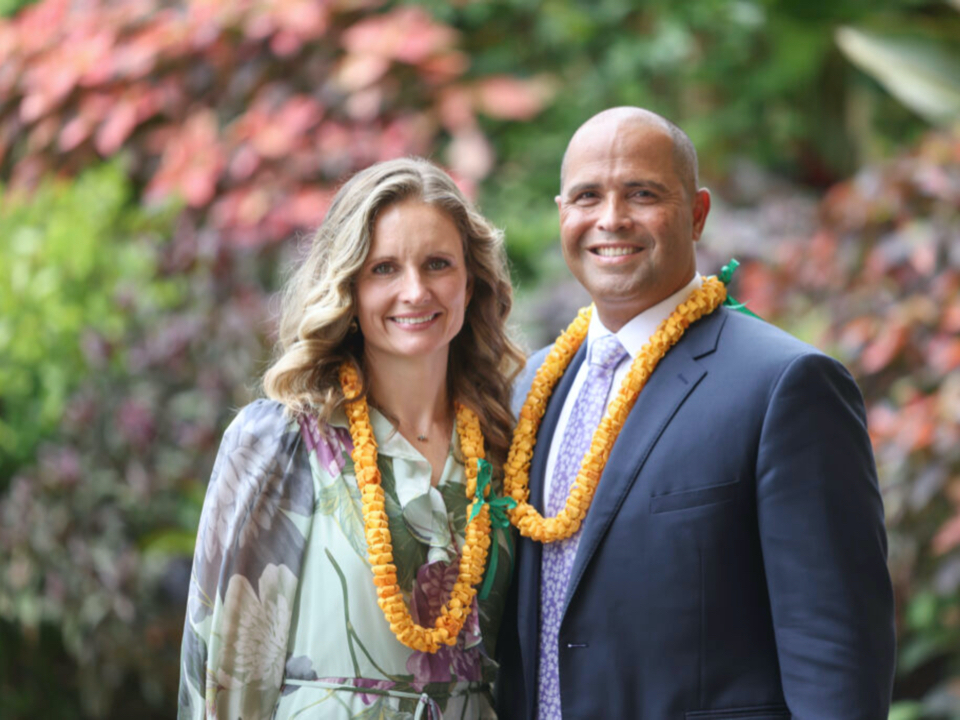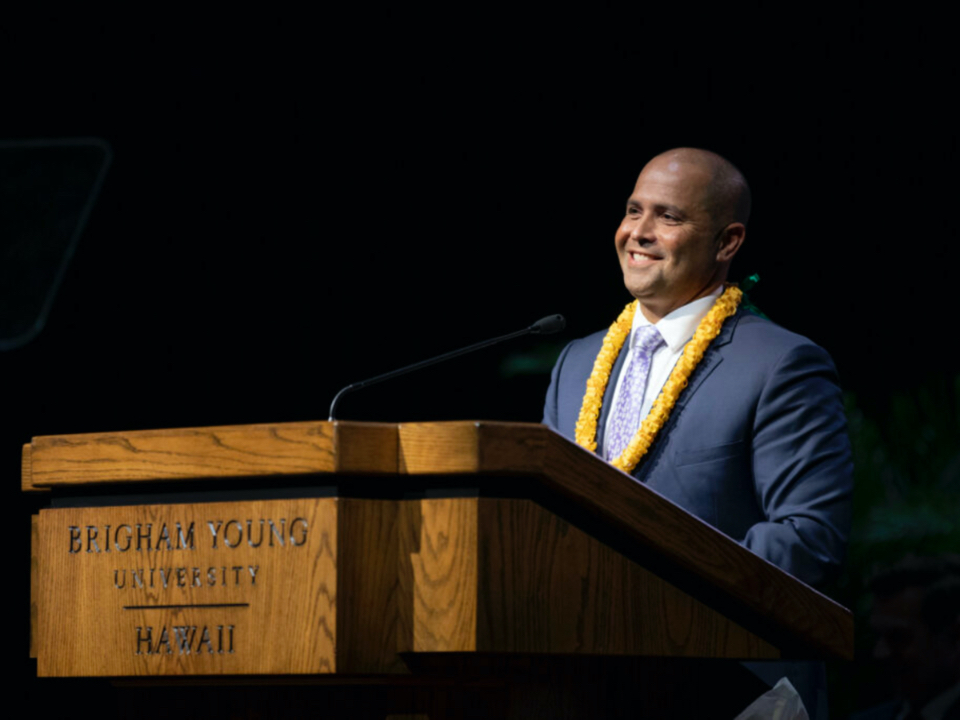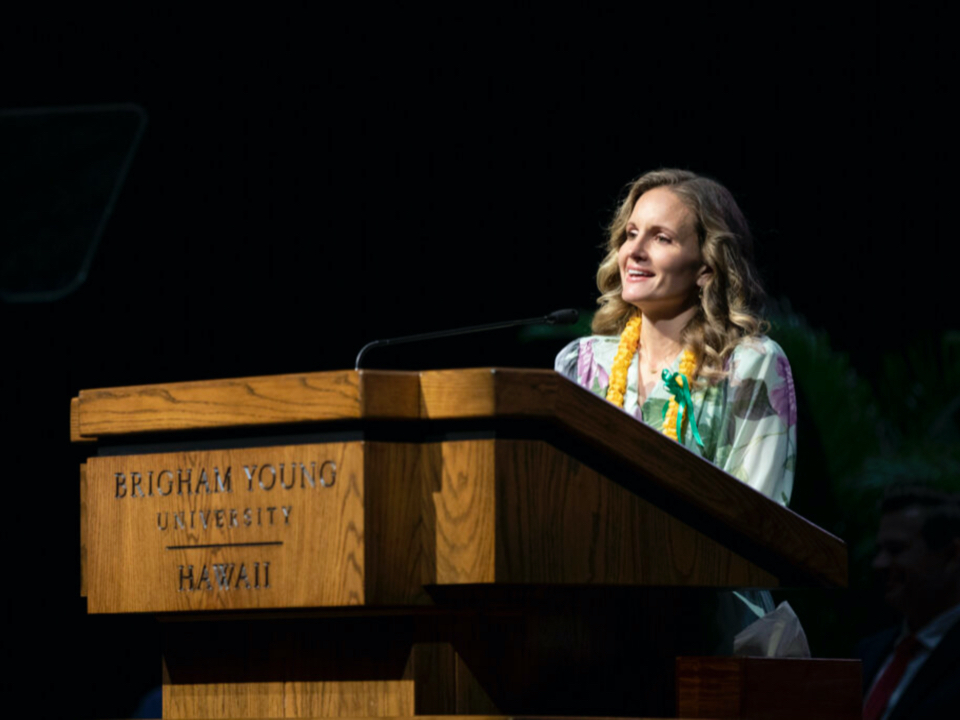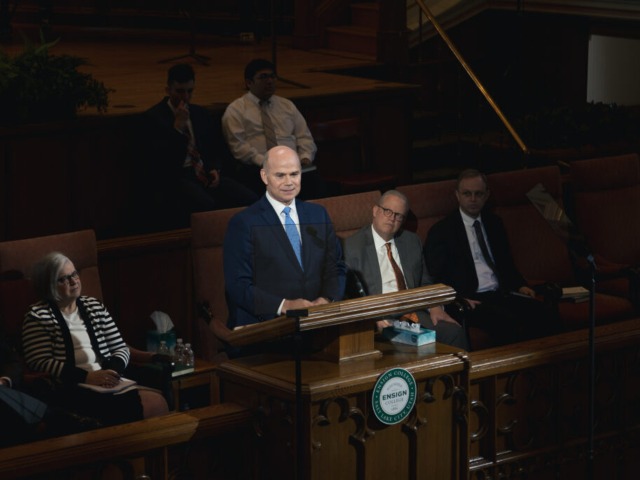
Pres_and_Monica_Kauwe8961-1-1024x683.jpg
BYU–Hawaii President John S.K. Kauwe III and his wife, Sister Monica Kauwe, pose for a photo following a devotional in the Cannon Activities Center in Laie, Hawaii, on Tuesday, May 3, 2022. Photo by Monique Saenz, BYU–Hawaii, courtesy of Church News.
This story appears here courtesy of TheChurchNews.com. It is not for use by other media.
By Valerie Walton, Church News
A Chinese parable tells of an old man who made his living raising horses in the countryside. One day, a horse ran away, a significant loss to his family. His friends came to console him, but the old man wasn’t worried in the slightest.
“Good news, bad news, who knows?” he said.
The horse later returned with a strong and healthy companion horse that joined the old man’s stable. But later, the new horse became unruly and caused the man’s son to fall and break his leg. However after a year, the country went to war and his son wasn’t drafted due to his crippling injury and both the old man and the son survived the war.
Whether they were good events or bad, the old man had the same response each time: “Good news, bad news, who knows?”
BYU–Hawaii President John S.K. Kauwe III grew up listening to this story and hearing the same expression from his parents during the ups and downs of their lives.
“We all know trials, challenges and unfairness are part of life. No one is exempt,” he said during a devotional address on Tuesday, May 3. However, there is a basis and purpose for those trials and challenges.
President Kauwe and his wife, Sister Monica Kauwe, spoke to students gathered in the Cannon Activities Center on the BYU–Hawaii campus in Laie, Hawaii, during the first devotional of the spring semester.
Purpose of Challenges and Trials
The Book of Mormon prophet Lehi taught his son Jacob about the purpose of trials: “For it must needs be, that there is an opposition in all things. If not so, my firstborn in the wilderness, righteousness could not be brought to pass, neither wickedness, neither holiness nor misery, neither good nor bad. Wherefore, all things must needs be a compound in one; wherefore, if it should be one body it must needs remain as dead, having no life neither death, nor corruption nor incorruption, happiness nor misery, neither sense nor insensibility” (2 Nephi 2:11).
Despite many other teachings from prophets in the scriptures or latter days, trials are still difficult to experience, President Kauwe said.
A few years ago, he lost his dear friend Big Wave Dave. Despite being healthy and strong, Big Wave Dave was diagnosed with cancer and died in what felt like the blink of an eye. He left behind a wife and eight children.
“To this day, I do not fully understand the Lord’s purpose in taking Big Wave Dave from this earth,” President Kauwe said. It still feels like he was taken too soon.
“Amid the pain we experience in this mortal life, it is easy to wonder, how can we endure?” he said.
President Kauwe shared three ways to do so.

2022.05.03-Devotional-President-and-Sister-Kauwe_5-1024x683.jpg
BYU–Hawaii President John S.K. Kauwe III speaks during a BYU–Hawaii devotional in the Cannon Activities Center in Laie, Hawaii, on Tuesday, May 3, 2022. Photo by Mark Gatus, BYU–Hawaii, courtesy of Church News.
Have Faith
First, one needs to have faith in God’s plan of happiness and Christ’s Atonement. The Savior suffered all things to fulfill Heavenly Father’s plan and bring everyone salvation.
“We must have faith that His suffering and Atonement are infinite and eternal; faith that the unfairness of this world has a purpose; faith to believe that situation is temporary; and faith that all things will be made right, the demands of justice satisfied, and mercy provided to us and all around us through our Savior Jesus Christ.”
Trust God and Be of Good Cheer
Second, trust Him and be of good cheer.
In scripture, the Lord has repeatedly taught those in troubling circumstances that the ultimate outcome will be in their favor. For instance, in John 16:33, Christ teaches, “These things I have spoken unto you, that in me ye might have peace. In the world ye shall have tribulation: but be of good cheer; I have overcome the world.”
“When you focus on Christ and His gospel, you can, as President [Russell M.] Nelson said, ‘feel joy regardless of what is happening — or not happening — in’ your life” (“Joy and Spiritual Survival,” October 2016 general conference).
Rely on Each Other
Third, rely on one another to endure trials. The old man in the Chinese parable could not have endured his trials if he didn’t have his friends who came to comfort him or celebrate with him, President Kauwe said.
“In your baptismal covenant, you took upon yourselves the name of Jesus Christ and promised to always remember him, keep his commandments and serve Him always,” he said.
“When we seek to honor these covenants and be more like Jesus Christ, we will certainly feel an increase of love and compassion for those around us and a desire to serve them.”
Each person can make a difference for someone else. BYU–Hawaii students and employees have that opportunity at this school, he said.
“I testify to you that the gospel of Jesus Christ has the power to bring peace and good cheer, even amid the trials of this life. You can and will have access to that power as you seek to love and serve as a disciple of Jesus Christ.”

2022.05.03-Devotional-President-and-Sister-Kauwe_2-1024x683.jpg
Sister Monica Kauwe speaks during a BYU–Hawaii devotional in the Cannon Activities Center in Laie, Hawaii, on Tuesday, May 3, 2022. Photo by Mark Gatus, BYU–Hawaii, courtesy of Church News.
An Empty Pot
Integrity, according to C.S. Lewis, is “doing the right thing, even when no one is watching.”
Sister Kauwe expanded on that definition, adding, “When you have integrity, your actions match your words and you do what you say you will do. You are honest with yourself and others.”
She shared the Chinese tale called The Empty Pot by Demi, in which a boy named Ping becomes emperor through his integrity. When the aging emperor invites all the children in the land to plant seeds he gives them, Ping is the only one to bring an empty flower pot whereas the others bring beautiful flowers they have grown. The emperor had cooked the seeds, so he knew that Ping was the only honest child, and therefore, Ping became the next emperor.
This story inspired questions that Sister Kauwe shared with the audience: “Am I living with integrity? Am I doing things in my life that I am proud of and am willing to stand by? Are there areas in my life where I could be showing more integrity?”
One way BYU–Hawaii students can apply their personal integrity is through adhering to the school’s honor code and dress and grooming standards, “which applies to all of us and which we all made a voluntary commitment to follow when we became part of this special community,” she said.
Following the honor code and dress and grooming standards is one example of one’s integrity, Sister Kauwe said.
“Integrity is contagious,” she said. “When we live according to its principles, others catch on.”
Copyright 2022 Deseret News Publishing Company.
